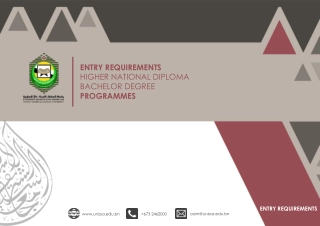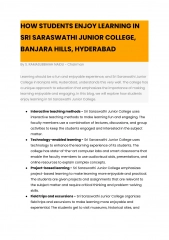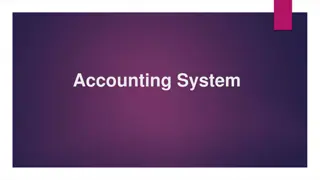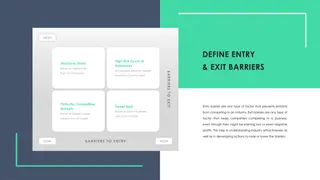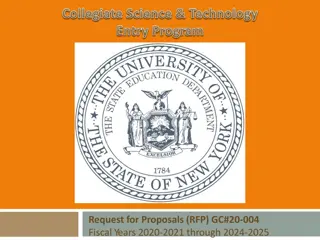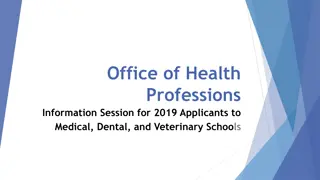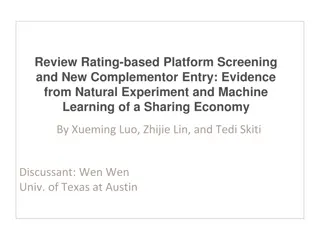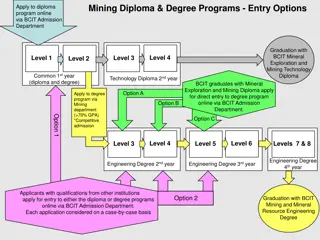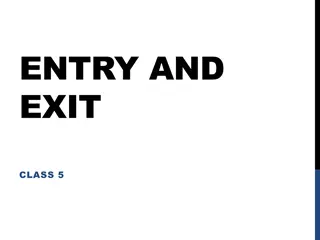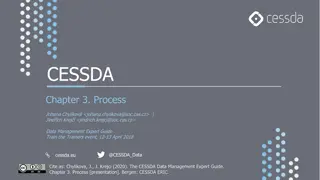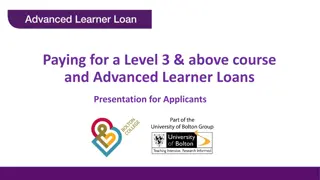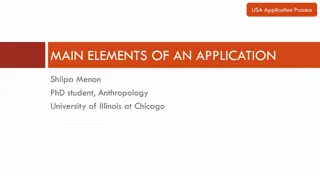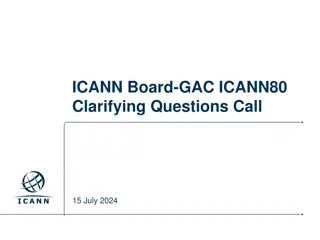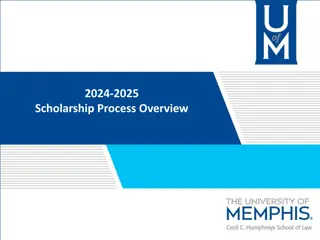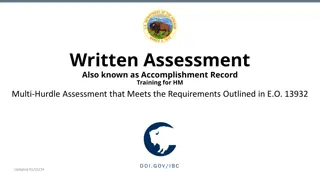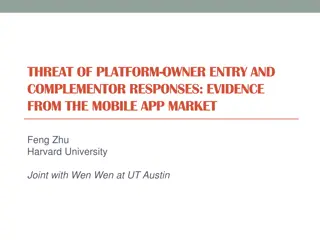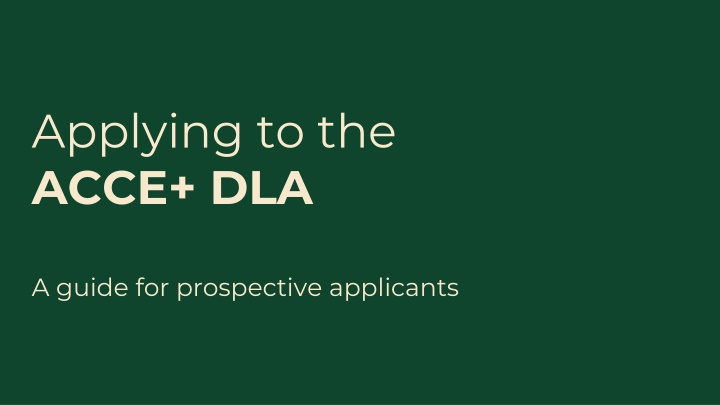
Guide to Applying for ACCE+ DLA PhD Projects
This guide provides essential information for prospective applicants interested in applying for ACCE+ Doctoral Landscape Award (DLA) PhD projects. It covers details about ACCE+, the application process, and how to prepare a strong application. ACCE+ offers funded PhD opportunities in partnership with leading institutions and addresses challenges related to environmental change.
Download Presentation

Please find below an Image/Link to download the presentation.
The content on the website is provided AS IS for your information and personal use only. It may not be sold, licensed, or shared on other websites without obtaining consent from the author. If you encounter any issues during the download, it is possible that the publisher has removed the file from their server.
You are allowed to download the files provided on this website for personal or commercial use, subject to the condition that they are used lawfully. All files are the property of their respective owners.
The content on the website is provided AS IS for your information and personal use only. It may not be sold, licensed, or shared on other websites without obtaining consent from the author.
E N D
Presentation Transcript
Applying to the ACCE+ DLA A guide for prospective applicants
This guide provides important information to help you apply to ACCE+ PhD projects We will cover: What is ACCE+ How the application process works How to prepare a great application
ACCE+ Addressing the Challenges of Changing Environments ACCE+ is a Doctoral Landscape Award - DLA . DLA programmes offer high-quality funded PhD opportunities in centres of excellence, with integrated research training and development. ACCE+ is a partnership between the Universities of Liverpool, Sheffield and York, the Natural History Museum (NHM), National Oceanography Centre (NOC) and the UK Centre for Ecology and Hydrology (UK CEH).
ACCE+ ACCE+ funds around 20 PhD studentships a year across the 6 institutions All projects seek to address a specific challenge associated with the nature, causes and consequences of environmental change ACCE+ funding covers your pay ( stipend ), fees, and money for carrying out the project (research training support grant, RTSG)
ACCE+ ACCE+ students take part in a range of training and supported activities, which include: A variety of training courses (public engagement, policy, reproducible research, employability etc) Placements with external organisations ACCE+ cohort activities such as annual conference, writing retreats and interdisciplinary global challenge days.
Application process ACCE+ PhD applications follow a competitive application process where not all advertised projects will be funded. Consequently applications are highly competitive. However, ACCE+ is committed to ensuring equity in its recruitment. We have designed an application process which aims to minimises biases driven by opportunity and advantage. We aim to identify students with the best potential for success
An overview of the process Applicants apply to their preferred projects by the 8th Jan 2025. You may apply to as many projects as you wish. Typically projects attract ~5-15 applications. Project supervisors select 1 candidate to put forward. Candidates can only be selected for 1 project per institution. The ratio of selected candidates to funded projects is ~2.5:1 These candidates then go forward to panel selection and, if successful, interview (approx mid/late Feb 2025)
How we assess candidates When you apply you must fill out an ACCE+ proforma (links provided at the end). The proforma is formed of 5 questions designed carefully to showcase candidates passion, commitment and creativity You also have the opportunity to contextualise your application by describing any relevant background which helps us understand your application.
1. Selecting your project(s) Successful applicants will be those who are truly passionate about the subject area of the project they are applying to. It is key to successfully completing a PhD! Ensure you apply to projects which excite you, and if you apply to more than 1 project, take care over each application individually i.e. ensure responses are tailored, where necessary to that project.
1. Selecting your project(s) Each project team will host a Project drop-in session between 2nd-13th December 2024. These sessions will introduce project supervisors, details of the project background and day-to-day life. It is also an opportunity for you to ask questions. To avoid bias among applicants we have asked project supervisors not to speak with candidates directly so the drop-in sessions are the best way of finding out about projects.
1. Selecting your project(s) Note that project drop-ins will be recorded and made accessible to all. If you miss a session you can catch up later and even ask questions to potential supervisors via the live project FAQ document. Details including timings, links and recordings can be found on the ACCE website or linked via the project adverts
2. Preparing your application Your application will be primarily assessed based on the proforma using a selection rubric you can view here Each proforma question is designed to showcase the attributes outlined in the rubric - so reading this is the surest way to maximise the quality of your application.
2. Preparing your application Q1. What inspires you about the project you have applied for? Here we are looking for evidence of alignment between your interests and the project. Great answers will both describe and demonstrate your interest. For example, demonstrating that you have read studies relating to the project and understand its significance in a wider context.
2. Preparing your application Q2. Describe your skills You should have an awareness of the needs of a PhD and of the skills needed for the project you are applying to Don t worry if you don t have those skills yet though - a PhD is a training degree after all. Good answers will identify what training you need and give examples of where and how you have developed new skills in the past.
2. Preparing your application Q3. Your commitment to science We are looking for candidates who have gone above and beyond their degree by engaging in activities that advance their own science or that of those around them. Note that commitment can look very different depending on access and privilege so interpret this broadly - e.g. we know that someone who has overcome major challenges to complete their degree is just as committed as the person who volunteered their time to outreach or science related work.
2. Preparing your application Q4. Tell us about a recent piece of science that excited you Here we are looking for enthusiasm, creativity and insight. You may choose to talk about your own work or that of others but either way a great answer goes beyond merely describing the study. Show us that you understand the importance of the work and how you might have modified or extended it.
2. Preparing your application Q5. Contextualising your application Here you are asked to provide any detail that you feel might provide useful background to your application. Specifically where you have experienced barriers to your progress This might be societal, e.g. belonging to a minoritised group known to experience bias, or personal, e.g. overcoming illness or juggling caring responsibilities
2. Preparing your application Q5. Contextualising your application This information will not be used to rank your application but can be used to better understand your achievements and application. Be assured that all selection stages are reviewed by an independent observer who will ensure that this information is used appropriately to benefit your application.
3. Other documents you need The proforma should be submitted along with: The application form for the institution you are applying to (find the details from here) - a CV. 1-2 pages focused on experience relevant to doing a PhD and the project. A great CV will briefly highlight this relevance e.g. work in a cafe might highlight organisation and time management. More support can be found at FindAPhD.com and DiscoverPhDs.com - Details of 2 referees. At least one should have a good understanding of your academic/research track record. - The ACCE+ mandatory EDI form. The ACCE+ team will send this to you to complete once you have submitted the other parts of your application, if you do not complete it at the start of the application. A form is also available on the ACCE website.
ACCE+ PhD projects offer training and support in addition to the project itself. They are competitive but our application process is designed to identify students with the best potential - regardless of the opportunities they have had previously. A good paper application is critical. Use the proforma and take advantage of the project drop-in sessions and review the assessment rubric to ensure yours is the best it can be. Application deadline is the 8th January 2025

